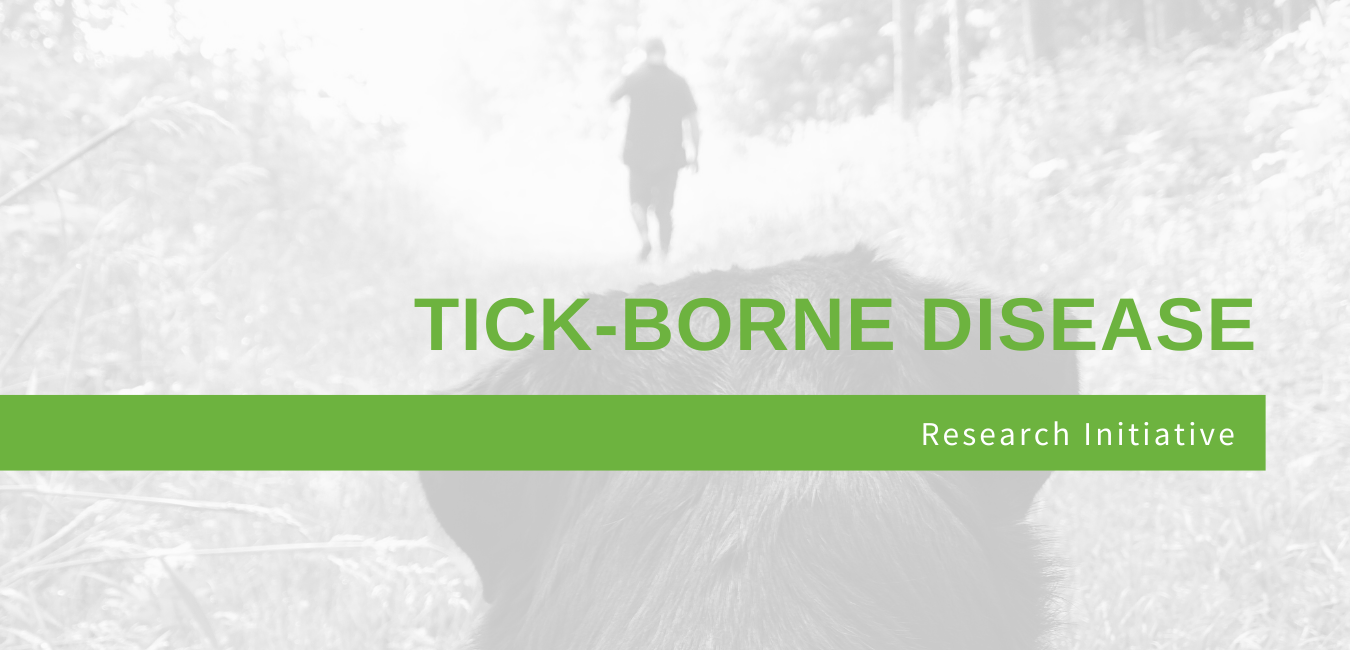
About the Tick-Borne Disease Research Initiative
The AKC Canine Health Foundation (CHF) Tick-Borne Disease Research Initiative was created in 2016 to address the growing threat of tick-borne disease to canine and human health. Disease occurs when ticks infected with a pathogen directly bites a dog or human and transmit the pathogen into the body. Many tick-borne pathogens infect dogs and can also infect humans. The geographic distribution of ticks is spreading and can change yearly by season and region of the United States. CHF is taking a One Health action to address the prevalence, diagnosis, and treatment of tick-borne disease. The most important tick-borne diseases of dogs are Ehrlichiosis, Anaplasmosis, Rocky Mountain spotted fever, Hepatozoonosis, Babesiosis, Bartonellosis, Hemotropic Mycoplasmosis, and Lyme disease. All can have serious health consequences, and infection rates have been on the rise over the past five years. The feeding time required for disease transmission from a tick to a dog or person can be as little as 3 – 6 hours!
Since 1995, CHF and its donors have invested more than $1.1M in 16 grants to study tick-borne disease. Current grants explore better methods to detect tick-borne diseases and recognize new pathogens, plus improve our understanding of how ticks locate dog hosts and how the canine immune system responds to tick-borne infections.
$1.1M invested in tick-borne disease research since 1995.

Learn More about the Initiative
Learn more about the Tick-Borne Disease Research Initiative (starting 7:50) by AKCtv's Ask the Expert: Epilepsy and Tick-borne Disease with former CHF CEO, Dr. Diane Brown.
View moreWhy Study It?
- The geographical range of tick species in North America is expanding
- The incidence of tick-borne diseases reported in dogs and humans continues to rise
- To understand why some infected dogs remain asymptomatic, while others develop life-threatening illness
- Dogs infected with tick-borne disease agents can act as sentinels for the same diseases in people
- Accurate diagnosis of co-infections (simultaneous infection with multiple vector-borne organisms) will facilitate early and comprehensive treatment
- Understanding which immune cells are responsible for the successful cure of a tick-borne infection may provide a target for treatment in all infected dogs
- Prevention is key for tick-borne disease; Strategies to improve tick control will improve the health of dogs and humans living in at-risk areas
Our Progress So Far
Current CHF-Funded Studies
The AKC Canine Health Foundation (CHF) believes in the advancement of science to meet the unmet medical needs of the dogs that are such an important part of our daily lives. Here we list the important active studies in this research program area.
| 02983 | Enhanced Detection and Characterization of Spotted Fever Group Rickettsia Species in Dogs and Ticks with Focus on a Novel Rickettsia Species Infecting Clinically Ill Dogs in the U.S. |
| 02981 | Genome-wide Identification and Characterization of Peptide Epitopes from Ehrlichia canis and Anaplasma platys with Potential to be Used as Vaccine Candidates |
| 02819 | Identification of Bartonella henselae In Vivo Induced Antigens for Development of a Reliable Serodiagnostic Assay for Canine Bartonelloses |
| 02528 | Developing a Next Generation Sequencing Diagnostic Platform for Tickborne Diseases |
| 02553 | Targeted Next Generation Sequencing Panel for Comprehensive Testing of Vector-borne Pathogens |
| 02386-A | Surveillance of Hepatozoon americanum in Populations of the Gulf Coast Tick |
| 02383 | Identifying Cellular Mechanisms of Inflammation During Canine Tick‐Borne Diseases |
| 02292 | Broad-Range Detection of Canine Tick-Borne Disease and Improved Diagnostics Using Next-Generation Sequencing |
| 02287 | Enhanced Testing for the Diagnosis of Bartonellosis in Dogs |
| 01780 | Defining the Mechanism by Which Ticks Locate Dogs in Order to Better Prevent Disease Transmission |
| 02295-A | The Role of Lymphocytes in Canine Monocytic Ehrlichiosis |
| 02285-A | Thrombocytopenia and Occult Vector-Borne Disease in Greyhound Dogs: Implications for Clinical Cases and Blood Donors |
| 02284-A | Lyme Disease in Dogs: Prevalence, Clinical Illness, and Prognosis |
Resources
|
Webinars:
|
 |
|
Podcast: Dr. Diane Brown, CHF CEO, spoke with Pure Dog Talk in 2018 for this podcast on Researching Connections Between Ticks and Cancer. Listen to the podcast here. |
|
|
Center for Disease Control and Prevention: Ticks |
|
|
Pet Health Network: Keep your dog safe from tick-borne disease. Learn about the ticks and diseases in your area from the Pet Health Network. |
|
|
Associated publications:
|
|
Articles
- Do vector-borne infections contribute to laboratory test abnormalities common in the Greyhound? (08/15/2022)
- The Future of Vector-Borne Disease Testing (09/20/2021)
- VECTOR-BORNE DISEASE DIAGNOSTICS: FROM "RUFF" TO "PURRFECT" (04/27/2021)
- Research Spotlight: Lyme Disease (01/26/2017)
- The AKC Canine Health Foundation Meets Year I Fundraising Goal for Tick-Borne Disease Initiative; Launches Year II to Continue Progress in Research (01/19/2017)
- AKC Canine Health Foundation Makes Strides in Tick-Borne Disease Research to Benefit Dogs (09/20/2016)
- Tick-Borne Disease Initiative Grants (09/16/2016)
- Fighting Tick-Borne Diseases in Dogs (04/13/2016)
- Fundraising for Research of Tick-Borne Diseases in Dogs Gets Boost from AKC (03/14/2016)
- The AKC Canine Health Foundation Launches Matched-funding Initiative to Fight Tick-Borne Diseases in Dogs (02/22/2016)
- Dog Update - Tick-Borne Disease Summer 2019 (06/04/2019)
Publications
Researchers awarded grants through CHF continue to produce a wealth of publications contributing to scientific knowledge. These scientific articles, grouped by publication date, are a result of CHF-funded tick-borne disease research!
- Kattoor, J. J., Nikolai, E., Qurollo, B., & Wilkes, R. P. (2022). Targeted Next-Generation Sequencing for Comprehensive Testing for Selected Vector-Borne Pathogens in Canines. Pathogens, 11(9), 964. https://doi.org/10.3390/pathogens11090964
- Kidd, L., Hamilton, H., Stine, L., Qurollo, B., & Breitschwerdt, E. B. (2022). Vector-borne disease and its relationship to hematologic abnormalities and microalbuminuria in retired racing and show-bred greyhounds. Journal of Veterinary Internal Medicine. https://doi.org/10.1111/jvim.16477
- Scorza, B. M., Mahachi, K. G., Cox, A. D., Toepp, A. J., Pessoa-Pereira, D., Tyrrell, P., Buch, J., Foltz, J. A., Lee, D., & Petersen, C. A. (2022). Role of NK-Like CD8+ T Cells during Asymptomatic Borrelia burgdorferi Infection. Infection and Immunity, 90(5), e00555-21. https://doi.org/10.1128/iai.00555-21
- Vasconcelos, E. J. R., Roy, C., Geiger, J. A., Oney, K. M., Koo, M., Ren, S., Oakley, B. B., & Diniz, P. P. V. P. (2021). Data analysis workflow for the detection of canine vector-borne pathogens using 16 S rRNA Next-Generation Sequencing. BMC Veterinary Research, 17(1), 262. https://doi.org/10.1186/s12917-021-02969-9
- Lashnits, E., Neupane, P., Bradley, J. M., Richardson, T., Maggi, R. G., & Breitschwerdt, E. B. (2021). Comparison of Serological and Molecular Assays for Bartonella Species in Dogs with Hemangiosarcoma. Pathogens, 10(7), 794. https://doi.org/10.3390/pathogens10070794
- Oney, K., Koo, M., Roy, C., Ren, S., Qurollo, B., Juhasz, N. B., Vasconcelos, E. J. R., Oakley, B., & Diniz, P. P. V. P. (2021). Evaluation of a commercial microbial enrichment kit used prior DNA extraction to improve the molecular detection of vector-borne pathogens from naturally infected dogs. Journal of Microbiological Methods, 106163. https://doi.org/10.1016/j.mimet.2021.106163
- Lashnits, E., Neupane, P., Bradley, J. M., Richardson, T., Thomas, R., Linder, K. E., Breen, M., Maggi, R. G., & Breitschwerdt, E. B. (2020). Molecular prevalence of Bartonella, Babesia, and hemotropic Mycoplasma species in dogs with hemangiosarcoma from across the United States. PLOS ONE, 15(1), e0227234. https://doi.org/10.1371/journal.pone.0227234
- Maggi, R. G., Richardson, T., Breitschwerdt, E. B., & Miller, J. C. (2020). Development and validation of a droplet digital PCR assay for the detection and quantification of Bartonella species within human clinical samples. Journal of Microbiological Methods, 176, 106022. https://doi.org/10.1016/j.mimet.2020.106022
- Parkins, N. D., Stokes, J. V., Gavron, N. A., Frankovich, A. N., & Varela-Stokes, A. S. (2020). Scarcity of Hepatozoon americanum in Gulf Coast tick vectors and potential for cultivating the protozoan. Veterinary Parasitology: Regional Studies and Reports, 21, 100421. https://doi.org/10.1016/j.vprsr.2020.100421
- Neupane, P., Sevala, S., Balakrishnan, N., Marr, H., Wilson, J., Maggi, R., Birkenheuer, A., Lappin, M., Chomel, B., & Breitschwerdt, E. B. (2020). Validation of Bartonella henselae Western Immunoblotting for Serodiagnosis of Bartonelloses in Dogs. Journal of Clinical Microbiology. https://doi.org/10.1128/JCM.01335-19
- Neupane, P., Hegarty, B. C., Marr, H. S., Maggi, R. G., Birkenheuer, A. J., & Breitschwerdt, E. B. (2018). Evaluation of cell culture-grown Bartonella antigens in immunofluorescent antibody assays for the serological diagnosis of bartonellosis in dogs. Journal of Veterinary Internal Medicine. https://doi.org/10.1111/jvim.15301
- Kidd, L., Qurollo, B., Lappin, M., Richter, K., Hart, J. R., Hill, S., Osmond, C., & Breitschwerdt, E. B. (2017). Prevalence of Vector-Borne Pathogens in Southern California Dogs With Clinical and Laboratory Abnormalities Consistent With Immune-Mediated Disease. Journal of Veterinary Internal Medicine, 31(4), 1081–1090. https://doi.org/10.1111/jvim.14735
- Trout Fryxell, Rebecca T., Hendricks, B. M., Pompo, K., Mays, S. E., Paulsen, D. J., Operario, D. J., & Houston, A. E. (2017). Investigating the Adult Ixodid Tick Populations and Their Associated Anaplasma, Ehrlichia, and Rickettsia Bacteria at a Rocky Mountain Spotted Fever Hotspot in Western Tennessee. Vector-Borne and Zoonotic Diseases, 17(8), 527–538. https://doi.org/10.1089/vbz.2016.2091
- Mays, S. E., Houston, A. E., & Trout Fryxell, R. T. (2016). Specifying Pathogen Associations of Amblyomma maculatum (Acari: Ixodidae) in Western Tennessee. Journal of Medical Entomology, 53(2), 435–440. https://doi.org/10.1093/jme/tjv238
- Mays, S. E., Houston, A. E., & Trout Fryxell, R. T. (2016). Comparison of novel and conventional methods of trapping ixodid ticks in the southeastern U.S.A. Medical and Veterinary Entomology, 30(2), 123–134. https://doi.org/10.1111/mve.12160
- Trout Fryxell, R. T., Moore, J. E., Collins, M. D., Kwon, Y., Jean-Philippe, S. R., Schaeffer, S. M., Odoi, A., Kennedy, M., & Houston, A. E. (2015). Habitat and Vegetation Variables Are Not Enough When Predicting Tick Populations in the Southeastern United States. PLOS ONE, 10(12), e0144092. https://doi.org/10.1371/journal.pone.0144092
- Mays, Sarah E, Hendricks, B. M., Paulsen, D. J., Houston, A. E., & Fryxell, R. T. T. (2014). Prevalence of five tick-borne bacterial genera in adult Ixodes scapularis removed from white-tailed deer in western Tennessee. Parasites and Vectors, 7, 473. https://www.ncbi.nlm.nih.gov/pmc/articles/PMC4207311/
- Barber, R. M., Li, Q., Diniz, P. P. V. P., Porter, B. F., Breitschwerdt, E. B., Claiborne, M. K., Birkenheuer, A. J., Levine, J. M., Levine, G. J., Chandler, K., Kenny, P., Nghiem, P., Wei, S., Greene, C. E., Kent, M., Platt, S. R., Greer, K., & Schatzberg, S. J. (2010). Evaluation of Brain Tissue or Cerebrospinal Fluid with Broadly Reactive Polymerase Chain Reaction for Ehrlichia, Anaplasma , Spotted Fever Group Rickettsia, Bartonella, and Borrelia Species in Canine Neurological Diseases (109 Cases). Journal of Veterinary Internal Medicine, 24(2), 372–378. https://doi.org/10.1111/j.1939-1676.2009.0466.x
- Henn, J. B., Gabriel, M. W., Kasten, R. W., Brown, R. N., Koehler, J. E., MacDonald, K. A., Kittleson, M. D., Thomas, W. P., & Chomel, B. B. (2009). Infective Endocarditis in a Dog and the Phylogenetic Relationship of the Associated “Bartonella rochalimae” Strain with Isolates from Dogs, Gray Foxes, and a Human. Journal of Clinical Microbiology, 47(3), 787–790. https://doi.org/10.1128/JCM.01351-08
- Henn, Jennifer B., Chomel, B. B., Boulouis, H.-J., Kasten, R. W., Murray, W. J., Bar-Gal, G. K., King, R., Courreau, J.-F., & Baneth, G. (2009). Bartonella rochalimae in Raccoons, Coyotes, and Red Foxes. Emerging Infectious Diseases, 15(12), 1984–1987. https://doi.org/10.3201/eid1512.081692
- Duncan, A. W., Marr, H. S., Birkenheuer, A. J., Maggi, R. G., Williams, L. E., Correa, M. T., & Breitschwerdt, E. B. (2008). Bartonella DNA in the Blood and Lymph Nodes of Golden Retrievers with Lymphoma and in Healthy Controls. Journal of Veterinary Internal Medicine, 22(1), 89–95. https://doi.org/10.1111/j.1939-1676.2007.0018.x
- Hawkins, E. C., Johnson, L. R., Guptill, L., Marr, H. S., Breitschwerdt, E. B., & Birkenheuer, A. J. (2008). Failure to identify an association between serologic or molecular evidence of Bartonella infection and idiopathic rhinitis in dogs. Journal of the American Veterinary Medical Association, 233(4), 597–599. https://doi.org/10.2460/javma.233.4.597
- Henn, J. B., Gabriel, M. W., Kasten, R. W., Brown, R. N., Theis, J. H., Foley, J. E., & Chomel, B. B. (2007). Gray Foxes (Urocyon cinereoargenteus) as a Potential Reservoir of a Bartonella clarridgeiae-Like Bacterium and Domestic Dogs as Part of a Sentinel System for Surveillance of Zoonotic Arthropod-Borne Pathogens in Northern California. Journal of Clinical Microbiology, 45(8), 2411–2418. https://doi.org/10.1128/JCM.02539-06
How to Get Involved
Thank you to the Sponsors of the Tick-Borne Disease Research Initiative!
Champion Sponsors ($50,000+)
 |
 |
 |
 |
 |
Ms. Kiki Courtelis |
Sponsors ($2,500+)
| Afghan Hound Club of America, Inc. Alaskan Malmute Club of America, Inc. American Brittany Club American Boxer Charitable Foundation American Chesapeake Club Charitable Trust American Field Pointer Association American Field Setter Association American Pointer Club American Shih Tzu Club Charitable Trust American Shih Tzu Club, Inc. American Whippet Club, Inc. Andrew Kirsner Australian Terrier Club of America Basset Hound Club of America Bearded Collie Club of America Border Terrier Club of America Bull Terrier Club of America Clumber Spaniel Health Foundation Cyclone County Kennel Club of Ames, Inc. Eastern German Shorthaired Pointer Club, Inc. English Setter Association of America, Inc. Field Spaniel Society of America German Shorthaired Pointer Club of America, Inc. Golden Retriever Foundation Gordon Setter Club of America, Inc. Great Pyrenees Club of America Greater Swiss Mountain Dog Club of America, Inc. Greyhound Club of America |
Health & Rescue Foundation of the Petit Basset Griffon Vendeen Club of America Irish Setter Club of America Foundation, Inc. Irish Wolfhound Club of America, Inc. Keeshond Club of America, Labrador Retriever Club, Inc. LEAP Agility National Amateur Retriever Club National Springer Spaniel Field Trial Association Newfoundland Club of America Charitable Trust Norwegian Elkhound Association of America, Inc. Parson Russell Terrier Association of America Pembroke Welsh Corgi Club of America Pembroke Welsh Corgi Club of America Charitable Trust Portuguese Water Dog Foundation Inc. Retriever News / Entry Express Rhodesian Ridgeback Charitable Foundation Rottweiler Health Foundation Samoyed Club of America Education & Research Scottish Terrier Club of America Siberian Husky Club of America, Inc. Soft Coated Wheaten Terrier Club of America, Inc. Staffordshire Terrier Club of America, Inc. TarTan Gordon Setter Club Tibetan Terrier Club of America/Tibetan Terrier Health & Welfare Foundation Treeing Walker Breeders & Fanciers Association United States Australian Shepherd Foundation Welsh Springer Spaniel Club of America, Inc. |
Help Future Generations of Dogs
Participate in canine health research by providing samples or by enrolling in a clinical trial. Samples are needed from healthy dogs and dogs affected by specific diseases.









